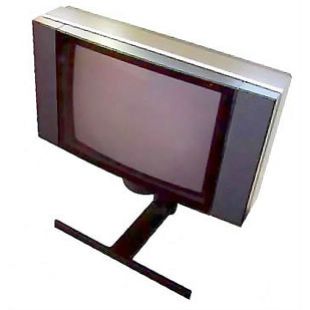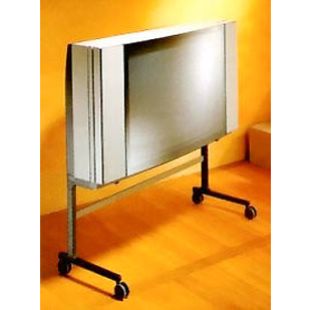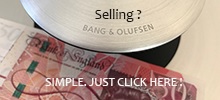BeoVision LS 6000
Manufactured: 1992 - 1993
Designer:
Colours: Teak, rosewood, grey metallic
Beovision LS5000 and LS6000 TV and video in all simplicity
A Bang & Olufsen TV is always a good investment. But perhaps you didn't want all the highly advanced functions in Bang & Olufsen's video systems. In that case, you could choose a television like Beovision LS instead. It had the same classic lines as Beovision LX and the quality again was extremely high. There was just a slight difference in design and technical specifications. For example, unlike Bang & Olufsen's video systems, Beovision LS and its VCR partner, Beocord V3000, could not be included in a Beolink® system.
Beovision LS was available as a 66cm or a 63cm TV - the LS5000 and LS6000 (as well as two further models - LS4500 and LS5500). All materials were of the finest quality and as always, attention to detail was meticulously made. For example, it was real wood that was used in the rosewood model and not plastic laminate. The glass screen in front of the picture tube was made of a high-quality glass, from Europe's leading glassmaker. It served two functions: it captured the light reflections that struck the screen, minimising their effect on the picture. And at the same time, it unified the appearance of the television.
Picture and sound in high quality
You obtained the same distinguished picture on a Beovision LS as on the more advanced TVs in Bang & Olufsen's range. The philosophy behind Bang & Olufsen's TV picture is that it should appear as natural as possible. One of the reasons for this choice is that your eyes tire quickly if colours are too strong. In comparison with other brands, this philosophy can make a Bang & Olufsen picture seem less like a picture postcard. But Bang & Olufsen would rather be compared to reality than to glossy reproduction.
The sound in Beovision LS5000 and LS6000 also lived up to the expectations you had for a Bang & Olufsen TV. The amplifier in the built-in two-way bass-reflex speakers was, in fact, the same fine quality that was used in audio systems.
Beovision LS6000 66cm television was the result of generations of development and provided superb natural colour which is balanced automatically up to 50 times every second. Its powerful loudspeakers were set smoothly on each side of the screen which stretched from the very top to the bottom of the cabinet. Fast Teletext access was provided together with, satellite compatibility and NICAM digital stereo sound including Beolink 1000 remote control.
Beovision LS5000 and LS6000 could be happily married to Beocord V3000 video cassette recorder and both Teletext and NICAM stereo sound were standard on both the Beovision LS5000 and LS6000.
BeoVision LS 6000 Product Specifications
Types:
EDS 4268 (1992 - Oct 1992)
EDT 4217 (1992 - May 1993)
ETS 4216 (1992 -Feb 1993)
GDT 4213 (1992 - Feb 1993)
CTV system: PAL B/G (singe standard)
Picture tube: (Visual picture) 70 cm (66 cm)
Picture tube system: flat square, Hi-Bri, In-Line 110 degrees
Cabinet: teak, rosewood, grey metallic
Main features: operation Beolink 1000, one-way
TV tuner range 46 - 855 MHZ: VHF, S, Hyper, UHF
No. of TV programmes: 32
Satellite: prepared for BeoSat LM
No. of satellite programmes: 99
Signal/noise level: > 35 dB/1 Vpp and antenna signal > 1mV
Crosstalk between sources: > 45 dB / 5 MHz
Teletext: 5 alphabet, memory: 4 x 32 page nos
Speaker system: 2 x bass reflex, full- range units
Sound system: NICAM EU + A2 stereo decoder + A2 dual languages
Long-term max. output power: 2 x 40 W / 8 ohms
Harmonic distortion: < 0.5% at 15 W
Intermodulation: < 1%
Signal-to-noise ratio: > 50 dB weighted 50 mV (NICAM > 70 dB)
Frequency range, audio: 25 - 20000 Hz +/- 1.5 dB
Power bandwidth: 25 - 20000 Hz
Channel separation A2 stereo: > 26 (NICAM > 70 dB)
Bass control: +/- 8 dB / 100 Hz
Treble control: +/- 8 dB /10000 Hz
Power supply: 220 - 240 V
Power consumption 100 (75 - 165) W
Power consumption stand-by 3 W
Dimensions W x H x D: 86 x 52 x 46cm
Weight: 42 kg
Connections: AV 21-pin
S-VHS
Motorised stand
External speakers
Stereo headphones
Created: 22nd December 2006
Modified: 3rd September 2007
Author Notes:






